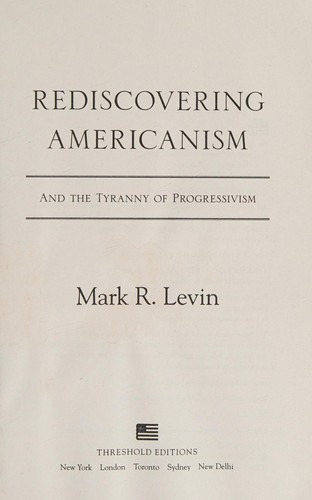archduke reviewed Rediscovering Americanism by Mark R. Levin
Review of 'Rediscovering Americanism' on 'Goodreads'
1 star
His basic argument: The Bible is what defines the West, and the Constitution, modeled on the Bible, but with more liberties, defines America. Marxism is opposed to the Bible (as it is to all religion) which means it is opposed to the Constitution. He makes a similar argument against science taking a role in determining economic / social positions. Interestingly, he tries to label Marxism and science as religion multiple times -- this reveals his affinity more strongly, as he does not explicitly present himself as a Christian. Let's not get into another one of his major axioms, that humans are endowed with free will, and that justifies inequalities. The freedom to be poor is a more important freedom for Levin than the freedom to be secure from disease, hunger, ignorance, and the rest.
It's funny how the author calls the founding fathers very religious men. Most were deists or …
His basic argument: The Bible is what defines the West, and the Constitution, modeled on the Bible, but with more liberties, defines America. Marxism is opposed to the Bible (as it is to all religion) which means it is opposed to the Constitution. He makes a similar argument against science taking a role in determining economic / social positions. Interestingly, he tries to label Marxism and science as religion multiple times -- this reveals his affinity more strongly, as he does not explicitly present himself as a Christian. Let's not get into another one of his major axioms, that humans are endowed with free will, and that justifies inequalities. The freedom to be poor is a more important freedom for Levin than the freedom to be secure from disease, hunger, ignorance, and the rest.
It's funny how the author calls the founding fathers very religious men. Most were deists or closet agnostics, despite being Masons. It's interesting that he uses positivism to smash German Idealism but then dismisses positivism as cultural relativism. (lol wut?)
The examples of communism he cites for the failures of Marxism are not communist systems in line with Marx's writings. You would have thought that someone who spent several pages quoting Marx would have read the man's works, but you'd be wrong. He does not discuss post-scarcity economics at length, despite post-scarcity scenarios being the pre-requisites for an "Authentic" Marxist revolution. Blah blah state socialism blah Maoism blah Lenin blah blah. The author interestingly cites capitalism as the force driving the industrial revolution, rather than the progress of technology. He does not talk about the countless deaths, cryptoslavery, environmental destruction, or waste of resources resulting from free market-style economics, but is happy to blame authoritarian genocides in authoritarian communist regimes for communist deaths. (Typical from libertarians & fundie capitalist WASPs...)
His argument defusing the Marxist tension between Bourgeoisie and Proletariat is that most workers like their bosses. That's a cute sentiment, but it's missing the point by miles.
About half of it is just citations from public domain sources; most of what surrounds these lengthy citations is just framing or snide remarks writing off extensive opposing viewpoints to his hypothesis as being just wrong.
He closes by essentially equating taxation, regulation, and messages of tolerance tyranny. At least he doesn't pull the "Hitler was a communist" card.
You're not a philosopher, Mark, despite quoting philosophers.
If you aren't a crazy, uneducated Christian, or a selfish person willing to use "patriotism" and "Christian ethics" as an emotional appeal, this work will not convince you. This work's tone and presentation is very similar to Christian fundamentalist apologies. If you don't subscribe to the Christian protestant work ethic, you will not find value in this book.

